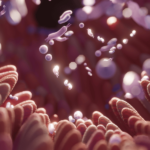Your digestive system, akin to a complex garden, is home to trillions of bacteria (1). This collection, known as the gut microbiota or microbiome, is a flourishing ecosystem. As research sheds more light on gut health’s influence on overall well-being, it’s clear that nurturing this internal garden is pivotal for healthcare. This post cultivates an understanding of the differences between antibiotics vs prebiotics vs probiotics – three key “gardeners” of your gut.
Antibiotics: The Weed Killers
Just as weed killers target unwanted plants but can also harm the beneficial ones, antibiotics are powerful medications designed to combat bacterial infections, but with a catch. They don’t differentiate between harmful and beneficial gut bacteria (2). While essential for treating infections, they can disrupt the diverse flora of your gut garden, sometimes leading to side effects like withering energy or an unbalanced ecosystem.
Prebiotics: THE FERTILIZERS
Prebiotics are like the rich soil and fertilizer that feed the garden of your gut. These undigestible dietary fibers are the food for probiotics, the good bacteria in your digestive system. Found in an array of fruits, vegetables, and whole grains, prebiotics ensure that beneficial bacteria bloom and thrive, reinforcing the robustness of your internal garden.
Probiotics: The Seedlings
Consider probiotics as the seedlings and young plants you introduce to enrich your garden. These live bacteria and yeasts are the allies of your digestive system, often called “good” or “helpful” bacteria because they help maintain a healthy gut. They restore the natural balance of gut bacteria, especially after disruption, much like planting new seeds after a storm or stress to reinvigorate your garden.
Prebiotics vs Probiotics: Cultivating Symbiosis
While prebiotics and probiotics sound similar, they play different roles in your gut garden. Prebiotics are the food that fertilizes the existing good bacteria, while probiotics are the good bacteria that contribute to gut health. When used together, they can create a symbiotic relationship, enhancing gut health more effectively than when used separately. This combination is sometimes referred to as “synbiotics,” which can be particularly beneficial in balancing the gut microbiome (3).
Incorporating Prebiotics And Probiotics into Your Diet
To fully nurture your gut garden, include a variety of prebiotic and probiotic foods in your diet. Asparagus, onions, garlic, onions, bananas, and whole grains can enrich the soil of your gut with prebiotics. For a probiotic boost, turn to fermented foods like yogurt, kefir, sauerkraut, and kombucha, akin to planting a diverse array of plants in your garden. Daily probiotic supplements are like consistent gardening, ensuring that your gut flora remains vibrant and diverse.
Nurture Your Gut With Research Verified Probiotic With Prebiotic
Conclusion: NURTURING YOUR GUT FOR A HEALTHY HARVEST
Just like a well-tended garden yields a bountiful harvest, understanding the interplay between prebiotics, probiotics, and antibiotics is essential for a balanced gut. While antibiotics are necessary for uprooting bacterial infections, they can disrupt the gut’s flora. Prebiotics and probiotics, however, are the key to cultivating a healthy balance of gut bacteria, critical for your overall health. By thoughtfully incorporating these elements into your diet, you support your digestive health, bolster your immune system, and enhance your mental well-being. Remember, a balanced gut is not just a part of you; it’s a living ecosystem that, when cared for, brings vitality and health.



